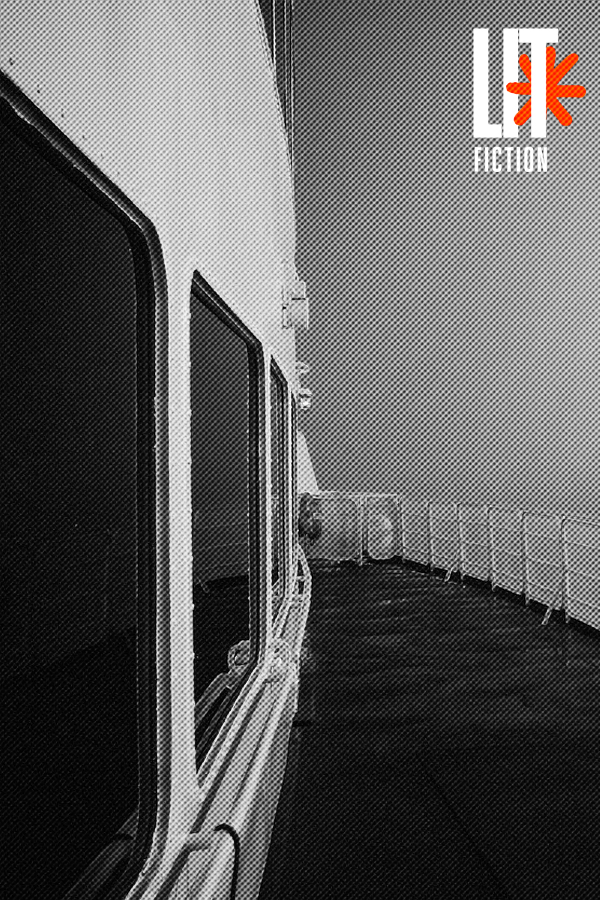Kevin Barry’s “Finistère,” featured in the April 15, 2024 edition of The New Yorker, follows the aftermath of fifty-five year old Cian John Wynn’s latest romantic breakup as he embarks on a self-imposed exile from Ireland, to start a new yet-to-be determined life in France. On the fifteen-hour ferry ride during which the narrative unfolds–and which is juxtaposed against a sequence of intermittent flashback scenes that reveal the beginning, brief middle, and rapid dissolution of Cian’s engagement to a woman named Sylvia–he befriends an eccentric, unnamed, sixteen year old girl in a relationship that at first seems–almost inevitably so–to be skidding on a Lolita trajectory.
But great literature, surprises, and does so convincingly (as E.M. Forster famously said about great literary characters), and in “Finistère,” this apparent trajectory does not manifest. What does, rather, is an encounter between two outsiders who do not fit the conventional societal molds; in the girl, Cian sees the possibility of an incipient version of himself as he was at her age; her path in life has yet to bifurcate; she can go in his direction, or she can choose a more conventional path. In Cian, the girl sees a kind of “Father” figure-–a fellow outsider, but with more life experience. Ultimately, though, Cian does not have many answers, and this he fully admits. The story takes its darkest turn when the two discuss mental illness, the chaotic nature of reality, the bleakness of life, and, finally, the question of suicide; but Cian ultimately rejects this option:
“It’s not like it’s never crossed my mind”, he said…”But…we must turn our eyes from death…It’s the sort of thing you’ll find will look after itself.”
Thus Cian’s is a life-affirming philosophy. But who is he, really? We contend that Cian is a kind of modern “superfluous man,” a Pechorn of sorts (from Lermontov’s A Hero of Our Time). We come to realize that Cian lives for brief, passionate love affairs–and that attempt at commitment and the status quo quickly subsumes him in a cloud of ennui. Indeed, we learn in a flashback sequence that he–uncharacteristically–proposed to Sylvia after a fight; two months later, the engagement is but a shattered remnant in the wake of a particularly nasty dispute. But one must ask: why would someone like Cian want to get engaged in the first place? This is the crux of his complex character, and, perhaps, what makes him most relatable–in a way that may be uncomfortable to admit. Specifically, from the very beginning, Cian is characterized by starkly contradictory sentiments; for example, the story’s first lines read:
The big man was in a condition of thrilling remorse. He was brokenhearted again at fifty-five and loving it.
Similar sentiments manifest throughout the story, and this encapsulates the protagonist’s essence: he is someone who is lonely and longs for human connection–but, simultaneously, one who cannot settle for the status quo committed life (even though, as above, he attempted to, with Sylvia); as he tells the girl:
“After the glow,” he said, “it’s all just box sets and nonsense.”
“Box sets!” she said. “My ‘folks’ have some of those.”
Such sentiments, are, perhaps, more familiar than many of us are willing to admit. (And note that this reminds us of Souvankham Thammavongsa’s great story, “Bozo“.)
Ultimately, his engagement with Sylvia ran aground on the shallow reef of his true feelings; and the rapid breakdown of their relationship–better sooner, than later, one must think–is not at all surprising given the obvious inauthenticity of his choice–above all, a kind of striving or wishful thinking for Cian.
The existentialist philosophers believe that we are our choices; and, as such, we must take full responsibility for them, and, consequently, our lives. Existentialist themes resonate throughout Mr. Barry’s wonderful story. Above all, we believe that this is story about living authentically, and of not conforming to societal pressures–despite the associated costs (most things in life are, after all, a trade-off). This is not to say that Cian is necessarily a likeable person–he is not; and he reckons with the detritus of ruined relationships that constitute his past, and harbors a kind of self-loathing as a consequence–but, in the end, he chooses authenticity over the comforts of stability:
He approached with a rippling heart the Tesla. He carried his broad shoulders square and proudly. There was a crackle of illicit energy from the big man…and he felt once more in his life that he had been rescued…He would drive fast now all day south and into the darkness and at the end of it there would be shellfish and cold white wine and the lovely cool dim of a single room, and maybe something just a little bit like sleep.
And thus while the story is fraught with a nervous tension between possibilities, the final lines make this story a true story, in the sense that George Saunders describes in A Swim in a Pond in the Rain. The ending imparts a feeling of acceptance; despite his flaws, Cian chooses to embrace his outsider nature, to go forth alone, boldly, into the unknown. And in this reckoning of the self, in this choice, he achieves not the coveted, everlasting–but ultimately, unachievable–feeling of happiness that many seek, but, rather, something similarly evasive but perhaps also immanently more achievable: a true sense of tranquility.

